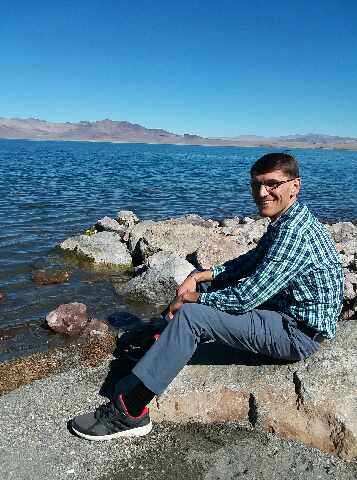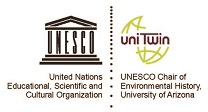Edward Schuyler Chew (PhD Candidate)
Report for UNESCO Chair in Environmental History Graduate Research Assistantship Edward Schuyler Chew, PhD Candidate, Dept. of SWES, University of Arizona, May 13, 2019
I am a Ph.D. Candidate in the Department of Soil, Water, & Environmental Sciences at the University of Arizona, my research is driven by a desire to help indigenous peoples manage their water and natural resources in a changing climate. Since 2013, I have been engaged in research efforts with the Pyramid Lake Paiute Tribe (PLPT) to understand vulnerability and resilience of tribal water resources and xplore adaptation strategies for the tribe to consider. My research considers how PLPT might address climate change vulnerabilities to water resources, both at small scales (impacts of floods, wildfires, and ecological decline) andbroad scales (community-wide, reservationwide, and basin-wide impacts). My research objectives are: (1) to explore and synthesize with PLPT tribal climate adaptation best practices; (2) to identify mechanisms for the integration of traditional knowledge in climate adaptation for PLPT; (3) to formulate a framework for a climate adaptation plan for PLPT.
With the support of the UNESCO Chair in Environmental History Graduate Research Assistantship, I have made significant progress on my dissertation research this 2018-2019 academic year. This GRA helped me to complete my dissertation prospectus which was approved by my Department of Soil, Water, and Environmental Science in October 2018. I was also able to move further along in my program by receiving UA Graduate College approval of my Doctoral Dissertation Committee Appointment form on November 7, 2018.
Throughout the year I worked with my advisor Dr. Karletta Chief on our climate change research collaboration with PLPT. I conducted three focus groups with tribal stakeholders in June and July of 2018. In addition to the 20 interviews that I have conducted since 2016, I have reached a total of 35 individual staff and stakeholders of the PLPT. The GRA allowed me to transcribe and code all interviews and focus groups with these stakeholders. I am analyzing the coded data using NVivo software which I intend to summarize for a final report to the PLPT Council. I prepared an infographic summary sheet of the research which will be included in the final report.
I shared my research with Indigenous communities, organizations, and institutions at the Native Waters on Arid Lands (NWAL) Tribal Summit in Reno, NV in October 2018. I presented to a Schuyler Chew at Pyramid Lake, October 2018 group of nine high school students from Pyramid Lake High School at the NWAL Youth Day
held at the Desert Research Institute on October 15, 2018. My talk on climate change impacts to PLPT water resources was followed by a visioning exercise to engage the students to think critically about environmental issues in their communities. On the following day, I traveled to Pyramid Lake High School in Nixon, NV to talk with high school students about applying to college. I also gave a joint presentation with my advisor on our research to the NWAL research team of grant PIs.
While attending NWAL, I connected with Navajo Technical University (NTU) Professor Steve Chischilly, who invited me to teach an online course related to tribal climate change in the near future. I submitted a draft syllabus and teaching application to NTU on November 9, 2018. NTU Dean Wesley Thomas and Professor Chischilly are interested in recruiting me for a Postdoctoral position at NTU to continue my research and help develop their graduate programs. I have also been in contact with Diné College Professor Margaret Mayer, who invited me to give online presentations in her climate change courses. The support of the UNESCO Chair in Environmental History GRA has been instrumental in advancing my research on indigenous peoples’ water issues. This support has helped me draft a
manuscript to the Journal for Contemporary Water Resources and Education special issue titled “Water in the Native World”. The focus of this paper is on the concept of resilience and its applicability to U.S. tribes in managing their water resources. I am looking into additional journals to submit a summary of my research with the PLPT.
Moving into the final year of my dissertation program, I plan to submit the final research report for approval by the PLPT Council and the Tribe’s Interdisciplinary Team. I may travel to Nixon, NV to present this report to the tribal council and conduct a final workshop with tribal stakeholders. I will continue to work on my dissertation manuscript for journal submission, look for future opportunities to engage in climate change education with NTU and Diné College students, and prepare for my doctoral defense in the fall of 2019. I am grateful to Dr. David Pietz and the UNESCO Chair in Environmental History for supporting my research and career
trajectories.
